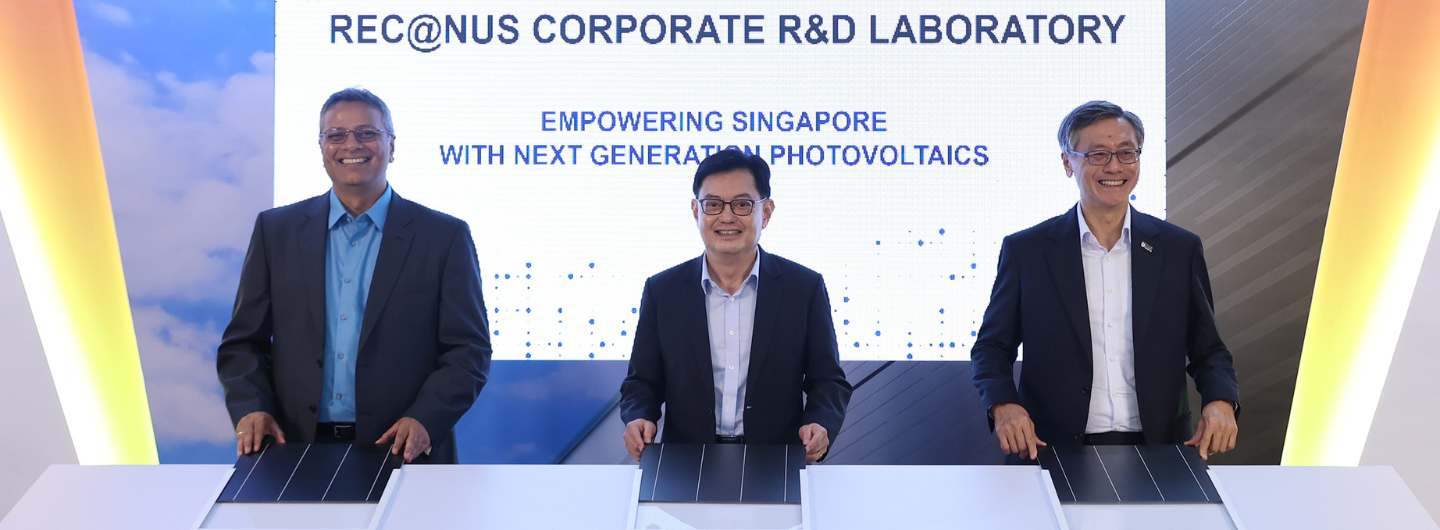DPM Heng Swee Keat at the Launch of REC@NUS Corporate R&D Laboratory for Next-Generation Photovoltaics
DPM Heng Swee Keat
Science and technology
16 June 2023
Remarks by Deputy Prime Minister and Coordinating Minister for Economic Policies Heng Swee Keat at the launch of REC@NUS Corporate R&D Laboratory for Next-Generation Photovoltaics on 16 June 2023.
This article has been migrated from an earlier version of the site and may display formatting inconsistencies.

Mr Hsieh Fu Hua, Chairman of the NUS Board of Trustees
Professor Tan Eng Chye, President of NUS
Dr Shankar G Sridhara, Chief Technology Officer of REC Solar Pte Ltd
Ladies and gentlemen,
I am delighted to be back in NUS today to launch the REC@NUS Corporate R&D Laboratory for Next Generation Photovoltaics.
NUS and REC Solar have shared fruitful collaborations for many years. Now, you are elevating your partnership to form the eighth Corporate Lab at NUS with the support of the National Research Foundation, Energy Market Authority, EDB and A*STAR. Corporate Labs enable academia and industry to work hand-in-hand to develop solutions that are actionable, scalable, and commercially viable.
The REC@NUS Corporate Lab will contribute to addressing arguably the most consequential issue of our times – climate change.
Climate change is a global existential issue which is affecting lives and livelihoods across the world. From small island-states like Singapore, to large countries like India, China, and the United States, the impact of climate change does not discriminate and is already keenly felt by all. This is why urban solutions and sustainability is a focus area under Singapore’s Research, Innovation and Enterprise 2025, or RIE2025, Plan.
Key to addressing climate change is achieving the target of limiting global warming to 1.5 degrees Celsius above pre-industrial levels.
For that to happen, we must deepen our R&D investments to achieve new technological breakthroughs and catalyse the green transition, including the transition to cleaner energy.
The formation of the REC@NUS Corporate Lab is timely, given that solar power is one of the most scalable, and thus promising, forms of renewable energy. The International Energy Agency (IEA) estimates that global annual investment in solar energy has tripled over the past decade, from US$127 billion in 2013, to US$382 billion in 2023.
This translates to at least US$1 billion being invested daily into solar energy and related technologies!
This is an indication that many leaders regard investing in renewables as not just being good for the planet and humanity, but also potentially good for business.
Through technological advances, the cost of solar photovoltaic, or PV, electricity has declined by an estimated 88% since 2010. This strongly increases the commercial viability of solar energy for consumers and businesses.
Here in Singapore, which is one of the most solar-dense cities in the world, solar energy is one of four “switches” to transform our energy supply.
There are solar panels in many of our buildings rooftop today and we plan to do even more. Under our Green Plan 2030, we aim to deploy at least 2 gigawatt-peak of solar energy by 2030, equivalent to the annual electricity needs of around 350,000 households.
Beyond cost, the next big leap needed to propel the broader adoption of solar energy is to improve its efficiency.
Today, the energy conversion efficiency of PV technology – meaning the percentage of solar energy that is converted into usable electricity – is at most 25%.
In comparison, wind turbines can be up to 40% efficient in converting wind energy into electricity.
If we can raise the efficiency rate for PV in a cost-effective manner, its business case will strengthen. This is exactly what the REC@NUS Corporate Lab is seeking to tackle.
The lab’s focus on low-cost tandem solar cells – stacking two solar cells one on top of the other – seeks to raise the efficiency of today’s single-cell solutions.
Cracking this innovation and subsequently scaling it to market, will require a multi-disciplinary, multi-sectoral approach. The collaborative approach embodied within the REC@NUS Corporate Lab is an important way to catalyse new breakthroughs.
The research-industry collaboration between NUS and REC Solar will enable the Lab to prototype new technologies across the solar PV value chain, and to develop linkages with companies both upstream and downstream in the supply chain.
The inter-university collaboration between NUS and NTU means that the Corporate Lab can bring together the best minds to produce cutting-edge research and technology. I encourage our universities to continue pursuing such opportunities for collaborative research, to harness your combine talent for wider societal benefit.
The public sector collaborations will enable the Lab to pilot and testbed new technologies and solutions across Singapore. Such innovations would not only help Singapore meet our climate and energy targets but also offer solutions for the region and beyond.
These multi-stakeholder linkages, drawing on the strengths of different actors, are a promising way to address a complex issue like climate change.
On our own, Singapore accounts for a tiny fraction of global emissions. Nonetheless, we must do our part. We hope to serve as one of the pathfinders – enabling partners to leverage our ecosystem and develop solutions that can be scaled regionally and even globally.
So I look forward to the work of the REC@NUS Corporate Lab paving the way towards game-changers that can accelerate global climate action.
In a similar spirit, I also encourage more companies to deepen your collaborations with our universities and research institutions, especially in key areas like sustainability.
Working together, instead of working alone, we stand a better chance of finding breakthroughs to global challenges that affect all of humanity.
On that note, congratulations once again to NUS and REC Solar on the launch of this Corporate Lab. I wish you all the very best! Thank you.
Explore related topics
